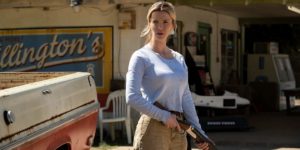No one is spared in Nick Cuse and Damon Lindelof’s THE HUNT, nor, as, will be revealed by the end, should they be. Our intrepid filmmakers have eschewed taking sides in the current political morass, instead opting for a more challenging take on the foibles of human nature itself. A bold move guaranteed to raise hackles. One suspects that it is deliberate.
This bitterly dark and potent satire takes as its model George Orwell’s Animal Farm, adds a dollop of MOST DANGEROUS GAME, and produces a black comedy that dissects not just the inherent evils of the class system but also of the, admittedly exaggerated (or is it?) outcome of unchecked wealth in conflict with the powerless, but discontented, poor.
As a film, it goes even further, toying with the audience’s sympathies as a cadre of the super wealthy, led by Hilary Swank, hunt a group of so-called deplorables for sport. Climate-change deniers and racists scramble for their lives amid tiger pits, land mines, and a variety of offensive weapons, while armed themselves by their opponents in a bid to level the playing field. Can you say metaphor? Liberals, spewing jargon about equality and proudly abhorring their lily-white privilege while displaying a breathtaking lack of self-awareness, chattering on about wine that costs a cool $250K, and with no clue about how it tastes.
Stupidity in various shades and manifestations abounds, as hypocrisy vies with willful, and wish-fulfilling ignorance. From one woman urging the assembly of a multicultural group to hunt in order to have the right optics, to another hunter castigating a fellow hunter for appropriating culture by wearing a kimono, the skewering is merciless and oddly refreshing.
As for the hunted, they are allowed their humanity, rather than being reduced to their politics. A disquieting move for those who insist on reductions. Plus, they are not all rednecks, with Ike Barinholtz providing the citified New Yorker whose views that to jibe with casual assumptions about the Big Apple.
Which brings us to Crystal (Betty Gilpin), who proves to be the most stereotype-busting in a film devoted to making  sport of them, and, in the process, provides the viewer with a metric by which to judge his or her own prejudices. The Mississippi twang, and the culturally approved face, hair, and body type contain a master survivalist and a kick-ass warrior. No-nonsense and to-the-point, she is the only character who does not live down to the others’ expectations. Nor does she care why she’s being hunted, only that she isn’t taken down. Played with canny instincts and unapologetic toughness by Gilpin, she is that most dangerous of creatures, according to some, the self-reliant woman fully aware of her considerable capabilities, who doesn’t give a damn what you think.
sport of them, and, in the process, provides the viewer with a metric by which to judge his or her own prejudices. The Mississippi twang, and the culturally approved face, hair, and body type contain a master survivalist and a kick-ass warrior. No-nonsense and to-the-point, she is the only character who does not live down to the others’ expectations. Nor does she care why she’s being hunted, only that she isn’t taken down. Played with canny instincts and unapologetic toughness by Gilpin, she is that most dangerous of creatures, according to some, the self-reliant woman fully aware of her considerable capabilities, who doesn’t give a damn what you think.
Tautly written, expertly played with deadpan sincerity, the story refuses to follow formulas, subverting political and cinematic expectations in favor of making its points in ways broad and subtle, using the very language of labels and epithets against their adherents with breathtaking skill, and an adroit use of irony.
By the end of THE HUNT, one’s laughter has become just a little self-conscious, and the sense of comfortable detachment has been punctured as neatly as Swank’s designer stiletto-heel has done the same to a deplorable’s eyeball.
Your Thoughts?